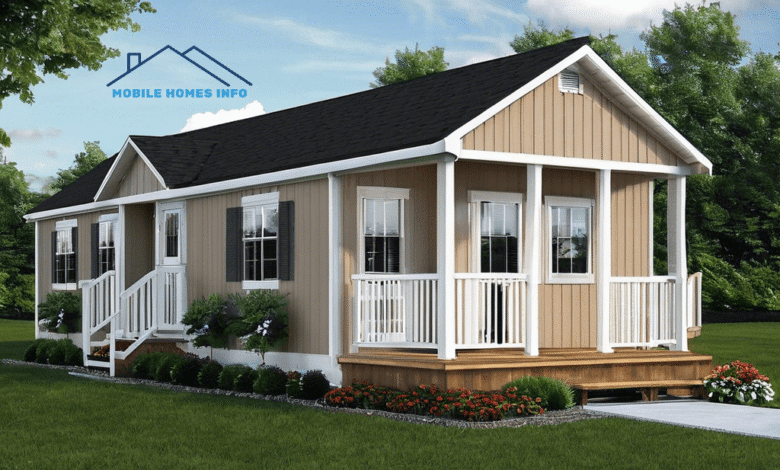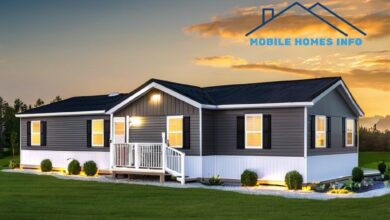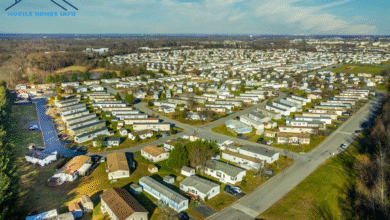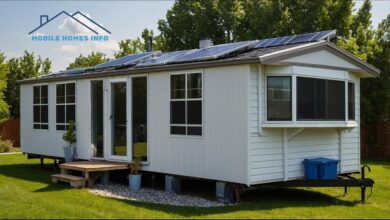Mobile Homes vs Manufactured Homes: Difference between Them and How to correctly use them

Introduction
The terms “mobile home” and “manufactured home” are often used interchangeably, leading to confusion among homebuyers, real estate professionals and even casual conversationalists. While both refer to factory-built housing, their meanings, legal definitions, and applications differ significantly. Understanding these distinctions is crucial for clear communication, effective real estate marketing, and informed decision-making. This comprehensive guide explores the differences between mobile homes and manufactured homes, their historical origins, correct usage, and the impact of misusing these terms on SEO and user experience (UX).
What is a Mobile Home?

A mobile home refers to prefabricated homes built in a factory and designed to be transported to a site for residential use. The term originated in the 1950s when these homes were marketed as easily movable, affordable housing options. Mobile homes were typically constructed before June 15, 1976, when the U.S. Department of Housing and Urban Development (HUD) introduced stricter building standards, marking a shift to what we now call “manufactured homes.”
Key Characteristics of Mobile Homes:
- Construction Year: Homes built before 1976.
- Design: Often smaller, with limited features compared to modern homes.
- Mobility: While mobile in design, many mobile homes are now stationary.
- Building Codes: Mobile homes were not regulated before 1976 under the strict HUD (U.S. Department of Housing and Urban Development) codes that govern manufactured homes today.
Mobile homes are characterized by their mobility, as they were designed to be towed to different locations, often on a chassis with wheels. They were popular for their affordability and flexibility, appealing to retirees, young families, and those seeking low-cost housing. However, they often faced criticism for lower construction quality, limited durability, and outdated designs compared to modern standards.
The term “mobile home” derives from the combination of “mobile,” from the Latin mobilis (meaning “movable”), and “home,” from the Old English ham (meaning “dwelling”). According to the Merriam-Webster Dictionary, a mobile home is “a prefabricated home that can be towed to a site on its own chassis.” Despite their name, many mobile homes are not frequently moved once placed, often remaining stationary in mobile home parks or private lots.
Mobile homes are significant in everyday life because they offer an affordable housing solution, particularly for those with limited budgets.
Sentence Examples with “Mobile Home”
Here are five examples illustrating the correct use of “mobile home”:
- The couple purchased a mobile home to live in while saving for a traditional house.” This sentence uses “mobile home” to describe an affordable, factory-built residence.
- The mobile home park offers affordable lots for retirees looking to downsize.” Here, “mobile home” refers to the type of housing in a community setting.
- Restoring a 1960s mobile home can be a cost-effective way to own a unique property.” The term emphasizes the historical context of pre-1976 construction.
- She decided to sell her mobile home after upgrading to a newer model.” This highlights the mobility and replaceability of mobile homes.
- The zoning laws restrict mobile homes to specific areas of the county.” The term is used in a regulatory context, indicating legal restrictions.
What is a Manufactured Home?
A manufactured home is a term used to describe homes built after June 15, 1976, adhering to the HUD Code, a set of federal standards ensuring safety, durability, and energy efficiency. Unlike mobile homes, manufactured homes are built to higher construction standards, often resembling site-built homes in design and quality. They are typically placed on a permanent foundation, though some retain a chassis for potential relocation.
The term “manufactured home” reflects the modern manufacturing process, emphasizing precision and compliance with federal regulations. The HUD Code, established under the National Manufactured Housing Construction and Safety Standards Act of 1974, governs aspects like structural integrity, fire safety, and energy efficiency. Manufactured homes are popular for their affordability, customization options, and ability to meet modern housing needs.

The word “manufactured” comes from the Latin manu factum (meaning “made by hand”), while “home” retains its Old English roots. The Oxford Dictionary defines a manufactured home as “a prefabricated home built to federal standards in a factory and transported to a site.” These homes are vital in addressing housing shortages, offering a cost-effective alternative to traditional homes while meeting stringent safety requirements.
Sentence Examples with “Manufactured Home”
Here are five examples illustrating the correct use of “manufactured home”:
- The new manufactured home features energy-efficient windows and modern appliances.” This highlights the modern design of post-1976 homes.
- They chose a manufactured home to enjoy the benefits of a permanent foundation.” The term emphasizes the home’s stability and compliance with HUD standards.
- The real estate agent listed a manufactured home with a spacious open floor plan.” Here, “manufactured home” is used in a marketing context.
- Manufactured homes must comply with HUD regulations for safety and durability.” The term is used in a regulatory context.
- He customized his manufactured home with a deck and landscaping to enhance its value.” This showcases the customization potential of manufactured homes.
Comparison Between Mobile Homes and Manufactured Homes
The table below summarizes the key differences between mobile homes and manufactured homes:
| Aspect | Mobile Home | Manufactured Home |
| Definition | A prefabricated home built before June 15, 1976, designed for mobility. | A factory-built home constructed after June 15, 1976, under HUD Code standards. |
| Construction Standards | Built to varying state or local standards, often less stringent. | Built to federal HUD Code, ensuring safety, durability, and energy efficiency. |
| Time Period | Pre-1976, often associated with older designs. | Post-1976, reflecting modern construction practices. |
| Mobility | Designed to be easily movable, often on a chassis with wheels. | Typically placed on a permanent foundation, though relocatable. |
| Perception | Often seen as lower-quality or temporary housing. | Viewed as comparable to site-built homes in quality and design. |
| Usage Context | Used in casual conversation or to describe older homes in parks. | Used in legal, real estate, and formal contexts for HUD-compliant homes. |
When to Use “Mobile Home” in a Sentence
Use “mobile home” when referring to:
- Prefabricated homes built before June 15, 1976, not subject to HUD Code.
- Housing in mobile home parks or communities, often emphasizing affordability or mobility.
- Historical or cultural discussions about older factory-built homes.
- Casual conversations where the term is understood to mean a movable, factory-built residence.
Avoid using “mobile home” for post-1976 homes that meet HUD standards, as this can mislead readers or buyers about the home’s quality and compliance.
How Often is “Mobile Home” Used?
The term “mobile home” is common in real estate, especially in regions with mobile home parks or older housing stock. It appears frequently in casual speech, real estate listings, and discussions about affordable housing. However, its use has declined in formal contexts since the introduction of “manufactured home” for HUD-compliant homes.
Synonyms of “Mobile Home”
Synonyms include:
- Trailer: Often used colloquially, though it may imply a smaller or less permanent structure.
- Prefabricated Home: A broader term for factory-built homes, including mobile homes.
- Factory-Built Home: Emphasizes the construction process, applicable to older mobile homes.
- Modular Home: Sometimes used interchangeably, though modular homes are distinct.
Example: “The trailer (mobile home) was relocated to a new park for seasonal use.” Here, “trailer” is a synonym, emphasizing mobility.
When to Use “Manufactured Home” in a Sentence
Use “manufactured home” when referring to:
- Factory-built homes constructed after June 15, 1976, compliant with HUD Code.
- Real estate listings or legal documents requiring precise terminology.
- Modern, high-quality prefabricated homes with permanent foundations.
- Discussions about housing regulations, safety standards, or modern design trends.
Avoid using “manufactured home” for pre-1976 homes, as this inaccurately suggests HUD compliance.
How Often is “Manufactured Home” Used?
“Manufactured home” is prevalent in real estate, legal, and regulatory contexts, especially among professionals. It’s less common in casual speech, where “mobile home” may persist due to familiarity. Its use is increasing as manufactured homes gain popularity for their affordability and quality.
Synonyms of “Manufactured Home”
Synonyms include:
- Factory-Built Home: Highlights the manufacturing process.
- Prefabricated Home: A general term for factory-built residences.
- HUD-Code Home: Emphasizes compliance with federal standards.
- Modular Home: Sometimes misused, but modular homes are built to local codes, not HUD standards.
Example: “The HUD-Code home (manufactured home) passed all safety inspections.” Here, “HUD-Code home” specifies regulatory compliance.
Why Are “Mobile Home” and “Manufactured Home” Misused and Interchanged in English?
The terms “mobile home” and “manufactured home” are homophones with overlapping histories, leading to frequent misuse. Both describe factory-built housing, and their visual similarities (e.g., prefabricated structures, often in parks) blur distinctions. Key reasons for confusion include:
- Historical Overlap: Before 1976, all factory-built homes were called mobile homes. Post-1976, “manufactured home” became the legal term for HUD-compliant homes, but older terminology persists.
- Cultural Usage: “Mobile home” is deeply ingrained in casual speech, often used generically for all factory-built homes.
- Lack of Awareness: Many people, including non-professionals, are unaware of the HUD Code distinction.
- Marketing Practices: Some real estate agents use “mobile home” for its familiarity, even for modern manufactured homes, to attract buyers.
Misuse can lead to misunderstandings, such as assuming a modern manufactured home is an outdated mobile home, affecting buyer perceptions or legal clarity.
Are “Mobile Home” and “Manufactured Home” the Most Commonly Misused Housing Terms?
While “mobile home” and “manufactured home” are among the most misused housing terms, they are not necessarily the most frequently confused. Other terms, like “condo vs apartment” or “modular vs prefabricated,” also cause significant confusion due to similar overlaps in meaning and usage. The misuse of “mobile home” and “manufactured home” is particularly prevalent in real estate and casual conversation, where precision is critical for clarity and trust.
Other Similar Misused Word Pairs in Housing and Real Estate
Here are five commonly misused word pairs in the housing context:
- Condo vs Apartment:
- Condo: A privately owned unit within a building or complex, with shared amenities.
- Apartment: A rented unit, typically without ownership. Misuse occurs when condos are called apartments in listings, confusing buyers about ownership status.
- Modular vs Prefabricated:
- Modular: Homes built in sections to local building codes, often indistinguishable from site-built homes.
- Prefabricated: A broader term for factory-built homes, including modular and manufactured. Confusion arises when modular homes are incorrectly called manufactured homes.
- Townhouse vs Rowhouse:
- Townhouse: A multi-story home sharing walls with neighbors, often with individual ownership.
- Rowhouse: Similar but typically part of a uniform row, with historical connotations. Misuse occurs in urban markets where terms are used interchangeably.
- Duplex vs Twin Home:
- Duplex: A single building with two separate living units.
- Twin Home: Two separate homes sharing a common wall, each on its own lot. Confusion arises in real estate listings mislabeling ownership structures.
- Single-Family vs Detached:
- Single-Family: A home designed for one family, which may share walls (e.g., townhouses).
- Detached: A standalone home with no shared walls. Misuse occurs when attached single-family homes are called detached.
How Content Writers and Real Estate Professionals Should Use “Mobile Home” and “Manufactured Home”
Content writers must consider the following when using these terms:
- Context: Use “mobile home” for pre-1976 homes or casual references to mobile park residences. Use “manufactured home” for post-1976, HUD-compliant homes, especially in formal or legal contexts.
- Audience: Tailor terminology to the audience. Homebuyers may respond to “mobile home” for familiarity, while professionals require “manufactured home” for accuracy.
- Clarity: Avoid ambiguity by defining terms if both are used. For example, clarify that a “manufactured home” meets HUD standards, unlike older mobile homes.
- SEO Keywords: Use precise terms like “manufactured home for sale” or “mobile home park” to match search intent. Misusing terms can dilute keyword effectiveness.
- Formality: In formal writing (e.g., legal documents, industry reports), prioritize “manufactured home” to reflect regulatory compliance.
Writers should proofread to ensure correct spelling (e.g., no apostrophes in “manufactured”) and verify context to avoid misleading readers.
Can Content Writers Use “Mobile Home” and “Manufactured Home” in One Sentence?
Yes, both terms can be used in a single sentence if the context is clear. For example: “While the mobile home was built in 1970, the manufactured home next door complies with modern HUD standards.” This sentence distinguishes the historical and regulatory differences. However, writers should caution readers about potential confusion, as the terms’ similarity may obscure meaning. It’s often better to use them in separate sentences for clarity, especially in marketing or educational content.
Practical Advice for Choosing Between Mobile and Manufactured Homes
When deciding between a mobile home and a manufactured home, consider:
- Budget: Mobile homes are often cheaper but may require more maintenance due to older construction. Manufactured homes cost more upfront but offer better durability and energy efficiency.
- Location: Mobile homes are common in parks with leased lots, while manufactured homes can be placed on private land or permanent foundations.
- Regulations: Verify local zoning laws, as some areas restrict mobile homes but allow manufactured homes.
- Long-Term Value: Manufactured homes typically retain value better due to HUD compliance and modern designs.
- Lifestyle: Choose mobile homes for temporary or seasonal use; opt for manufactured homes for permanent, high-quality living.
In real estate transactions, use “manufactured home” in listings to highlight quality and compliance, but clarify if referring to an older mobile home to avoid misleading buyers.
Conclusion
Understanding the difference between mobile homes and manufactured homes is essential for homebuyers, real estate professionals, and content creators. While both offer affordable housing solutions, their construction standards, historical contexts, and usage differ significantly. By using these terms correctly, you ensure clear communication, enhance SEO performance, and improve user experience. Whether you’re writing a real estate listing, researching housing options, or engaging in casual conversation, precise terminology matters.




